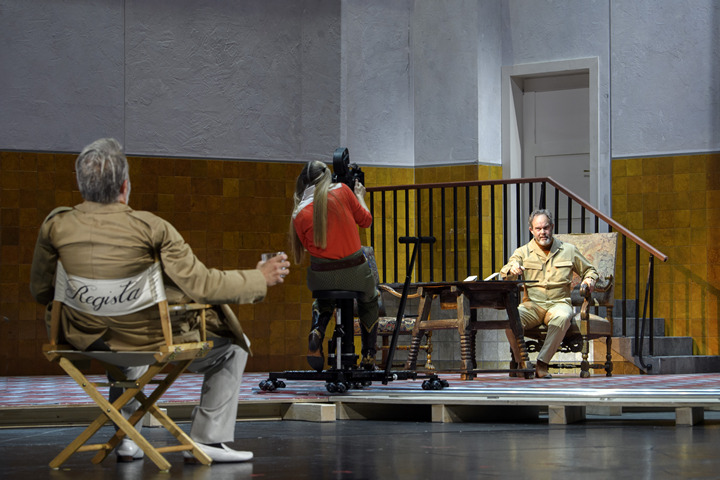| Opera Reviews | 2 May 2024 |
Hardly an Oscar winning performanceby Moore Parker |
|
Verdi: Falstaff |
|
 |
|
|
In decades of opera-going, I have never experienced such vociferous negative reaction to a production - with booing and yelling filling the auditorium - as darkness fell upon Act I on this particular evening. From the outset, the conflict is established in a quote that the director, Christoph Marthaler, doesn’t regard the piece as a comedy - contradicting the title page of the Ricordi score, and evidently at odds with more than a few audience members on this occasion. Following the interval six Italians failed to return to their stalls seats in front of me as did two other individuals in my row. Film settings appear en vogue these days with Rolando Villazón’s cinematic construct for last year’s (albeit, highly-successful) Il barbiere di Siviglia and a new production of Puccini’s La bohème this summer in London, to mention but two. Marthaler was evidently inspired by the Orson Welles film of 1965, and decided to add the film-maker/actor together with extras and technical team as characters to the Verdi opera. Welles is a kind of alter ego to the title role in similar costume - but with Falstaff repeatedly rejecting the padded paunch for his part - until in the tryst scene at the Oak in Act III where Alice effectively assaults him by forcing the garb upon his now “cuckold” figure. In brief, the expanse of the Grosses Festspielhaus is divided into three sections; a Screening Room, a central film set and the Ford’s swimming-pooled (Thames substitute) villa - presumably in Hollywood. Welles comes and goes throughout the action, sometimes directing, sometimes observing - while through his sheer existence managing Furthermore not a scene wherein the protagonists’ interaction demands full focus (Quickly’s first encounter with Falstaff, as an example) passed without some kind of trivial distraction competing elsewhere on the stage. Anna Viebrock was responsible for staging and costumes. The visuals deserve no further attention - but alas, the aural side of the evening too proved somewhat wanting, and certainly no comparison to the Festival showing a decade ago. With an historically colourful figure reduced to mere black and white, Gerald Finley had a challenging task here to show his true potential in the lead. He had been announced as indisposed at the premiere, but on this evening seemed to have found form, and sang a fine performance. The sheer beauty of his timbre and immaculate delivery were a joy, despite the staging conditions. Simon Keenlyside was obviously bitten years ago by the Verdi bug - while few of the composer’s baritone leads truly match his vocal capacities. If lacking the ideal weight of tone, this Ford was, nevertheless a compelling character with the clumsy, bespectacled dolt superbly rounded, and adequate in volume in his dramatic outbursts to make good effect. Bogdan Volkov stood out as a nerdy well-sung Fenton, with Thomas Ebensten (Dr Cajus), Michael Colvin, (Bardolfo) and Jens Larsen (Pistola) providing fine support among the male ranks. The female side of the cast began most subdued in all respects - This was Ingo Metzmacher’s first Falstaff - and indeed, despite typically fine playing by the Wiener Philharmoniker, the entirety lacked a sense of equanimity. Furiously driven, the opening scene was stressed by discord between stage and pit - mainly in tempi, but also regarding dynamics with some of the cast clearly pushed to carry over the orchestra. While the situation improved as the evening progressed, many fine details and entries (in Act III, Scene 2 for example) seemed nervous and unsettled - and oddly lacking in style. This production may go down in Salzburg history - but for the wrong reasons!
|
|







